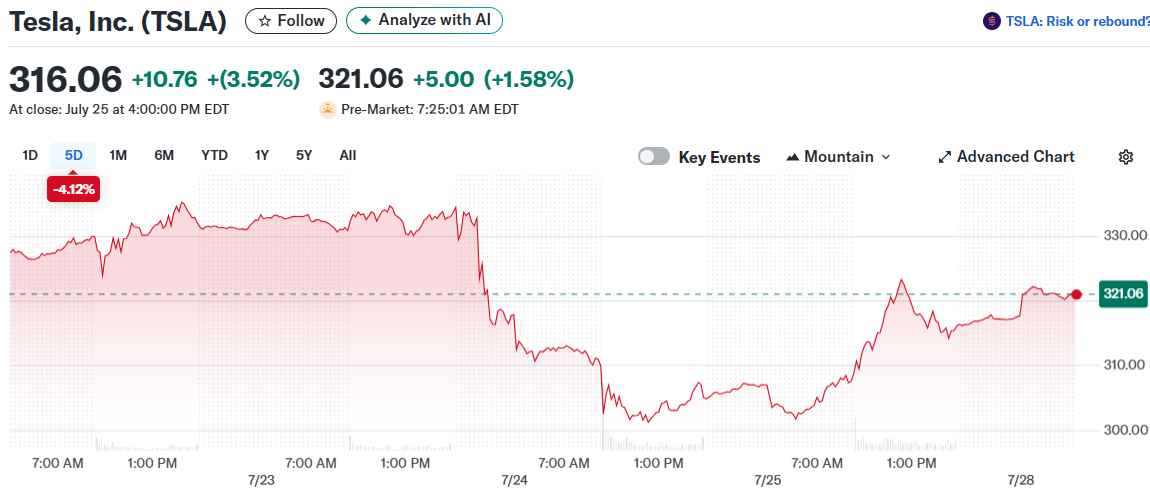TLDR
- Tesla CEO Elon Musk predicted the company could generate $30 trillion annually from humanoid robot sales if producing one billion Optimus robots per year
- Tesla signed a $16.5 billion deal with Samsung to produce AI semiconductors from 2025-2033, boosting Samsung’s foundry sales by 10% annually
- Tesla stock dropped 8% after Q2 earnings showed 16% decline in automotive sales and profits, then bounced 4% Friday
- The stock trades at 180 times estimated 2025 earnings, second-highest P/E ratio in the S&P 500 after Palantir
- Tesla plans to produce a few hundred Optimus robots by end of 2025, with higher production ramping in 2026
Tesla stock experienced its typical roller coaster ride this week, dropping 8% Thursday after earnings before rebounding 4% Friday. The electric vehicle maker closed at $316.06, up 3.52% in the latest session.

CEO Elon Musk made waves Saturday at the Tesla Owners of Silicon Valley “Takeover” party with some eye-popping predictions. Speaking virtually to the fan gathering in San Mateo, California, Musk outlined his vision for Tesla’s humanoid robot business.
“There’s a market for 20 billion robots,” Musk told the enthusiastic crowd. He painted a picture where Tesla could manufacture one billion Optimus robots annually at roughly $30,000 each. “That’s $30 trillion in revenue,” he said, calling it “probably the world’s biggest product.”
Of course, Musk acknowledged there’s a “long way to go between here and making one billion robots a year.” Tesla currently plans to produce just a few hundred Optimus robots by the end of 2025. The company had originally targeted a few thousand, but design changes for version three slowed the timeline.
Production is expected to ramp higher in 2026. Musk described the third version of Optimus as “the right design to go to volume production.”
Samsung Partnership Boosts AI Capabilities
Tesla’s robot ambitions got a boost with news of a massive semiconductor deal. Samsung Electronics will produce AI chips for Tesla in a $16.5 billion contract spanning 2025 to 2033.
Samsung’s giant new Texas fab will be dedicated to making Tesla’s next-generation AI6 chip. The strategic importance of this is hard to overstate.
Samsung currently makes AI4.
TSMC will make AI5, which just finished design, initially in Taiwan and then Arizona.
— Elon Musk (@elonmusk) July 28, 2025
The deal marks a win for Samsung’s struggling foundry division. Analysts calculate the contract could boost Samsung’s foundry sales by 10% annually. The partnership focuses on 2-nanometer generation chip production, representing cutting-edge semiconductor technology.
Tesla needs these advanced chips to power both its Optimus robots and self-driving car systems. Musk has repeatedly emphasized how AI underpins both initiatives.
“I’ve never seen any technology advance as fast as AI,” Musk said Saturday, describing it as a “supersonic tsunami.” He believes useful robots could be “pretty disruptive” in a world that spends roughly $50 trillion on human labor annually.
Stock Volatility Continues
Tesla shareholders are certainly used to wild swings. The stock has dropped 22% year-to-date while gaining 44% over the past 12 months.
Thursday’s 8% decline followed disappointing Q2 earnings. Tesla reported a 16% year-over-year drop in automotive sales and a 16% plunge in quarterly profits.
Friday’s 4% bounce showed the stock’s resilience. After-hours trading pushed shares even higher to $321.14.
The company trades at 180 times estimated 2025 earnings. That’s the second-highest P/E ratio in the S&P 500, trailing only Palantir Technologies.
Such lofty valuations suggest investors are betting heavily on Tesla’s future promises. Retail investors hold more than 40% of Tesla’s tradeable shares, compared to 25% for other Magnificent Seven companies.
These smaller investors often react strongly to events like the Silicon Valley “Takeover” party. It functions almost like a Wall Street conference for Tesla enthusiasts from around the world.
Regulatory and Competitive Challenges
Tesla faces headwinds beyond manufacturing challenges. Expiring U.S. EV credits and rising tariffs have hurt profitability. Chinese EV makers pose increasing competitive threats.
Musk’s robotaxi promises have met investor skepticism. The service remains in limited testing in Austin, Texas, facing regulatory hurdles and technical challenges.
Tesla’s recent earnings showed the pressure on traditional auto sales. Declining vehicle demand and shrinking margins concern analysts who focus on near-term fundamentals rather than long-term visions.
The Samsung chip deal represents Tesla’s commitment to its AI future. Whether that translates to actual robot revenue remains to be seen.
For now, Tesla continues balancing ambitious technological promises with current financial realities. The stock’s volatility reflects this tension between present challenges and future possibilities.
Tesla stock closed Friday’s session at $316.06, with the Samsung partnership providing a concrete step toward Musk’s robot aspirations.






